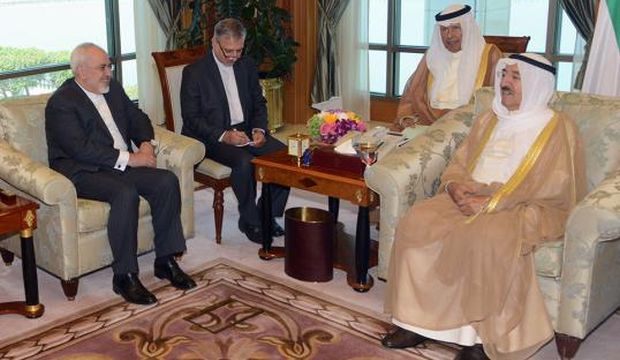The officially announced aims behind Iranian Foreign Minister Mohammad Javad Zarif’s latest tour of the Gulf include improving relations with some of Iran’s neighbors, explaining the ramifications of Tehran’s nuclear deal with the P5+1, and assuaging any concerns those countries may have regarding the agreement. There is, essentially, nothing wrong with that at all. Iran is in the end a major regional power, and any efforts by the region’s countries to promote stability in the Middle East must surely require its participation in order to be successful.
Much has already been said regarding the deal, which still requires the US Congress’s blessing in order to become active. Many have commented on the Western companies that await the opening of the lucrative Iranian market; likewise there has been much talk of the concerns the Gulf states have toward the deal and their disagreements with Washington regarding it. The truth is, however, that the recent deterioration in Iranian–Gulf relations has nothing to do with the nuclear agreement. After all, it is certain is that the P5+1 will be very careful to obtain strict guarantees to ensure Iran does not break the terms of the agreement and thereby upset the current global equilibrium regarding the proliferation of nuclear weapons.
No, the problems the Gulf states have with Iran are related to the many crises currently troubling the region, where both parties stand against each other politically, and sometimes even through indirect, though nonetheless heated, military conflict. All of these issues urgently require solutions, and if the Iranian regime is indeed serious about offering them, the Gulf states will be the first to welcome these changes in Iranian policies.
While in Kuwait, during the first phase of his current tour, Zarif spoke of the importance of regional cooperation in the fight against terrorist groups, and of course he is right with respect to his estimation of the danger such groups pose to everyone in the region. We know that the Gulf states, and in particular Saudi Arabia, are doing their duty here, waging an unrelenting battle against the cancer that has emerged as a result of sectarian strife in Iraq and the conflict in Syria—otherwise known as the Islamic State of Iraq and Syria (ISIS).
But a serious question now poses itself: What is to be done about the other extremist organizations and groups in the region which are, in one way or another, linked to Iran, whether militarily or ideologically? Here I am talking about groups such as Hezbollah in Lebanon, which is effectively holding an entire nation hostage; the extremist, sectarian groups in Iraq; and the Houthis in Yemen, who have succeeded in turning the entire country into a conflict zone and have threatened neighboring countries, especially Saudi Arabia. At this juncture we can pose another question: Does Iran actually have the ability to rein in these groups—should it want to—or has it effectively now lost control over them? Hezbollah leader Hassan Nasrallah, for example, recently said he still considers the United States, with whom Iran signed the nuclear deal, as the “Great Satan.” It is quite clear that in these comments Nasrallah sought to dissociate himself and his group from Tehran’s latest drive to pursue the negotiations and seal the agreement with the world powers.
In the end there is not much the Gulf states can do with respect to the deal; this really falls within the purview of the P5+1 and the International Atomic Energy Agency (IAEA), whom we hope have reached in the deal what will be enough to ensure international peace and security.
Regionally, on the other hand, we can say that in order to make this latest attempt at rapprochement by Tehran genuine, Iran must put an end to the various proxy wars it is currently waging across the region—in places like Yemen, Syria, and Lebanon. Iran is also responsible for one of the most dangerous developments in the region in recent years: the prominent role of militias and their superseding the state. This has created a deadly, toxic mix, one that leads only to destruction. It began in Lebanon, and now we have seen it spread to other countries such as Iraq.
If Iran is truly to win over its neighbors, it will need to undertake monumental efforts both on its own and with others in the region, in order to put out the flames it has started all over the Middle East—most recently in Yemen.
Is all of this truly possible after all these years of mistrust and tension? I believe the nuclear deal may well have opened the door for this to become a reality. Iran now has the opportunity to conduct its policies in the full light of day, without lurking in the shadows and trafficking with organizations and groups that, in the end, do not possess any kind of legitimacy.
